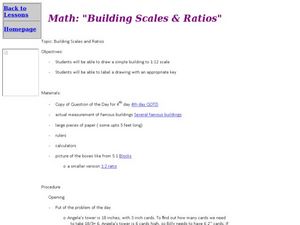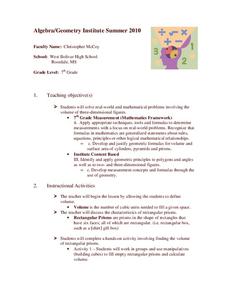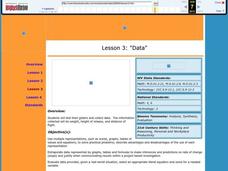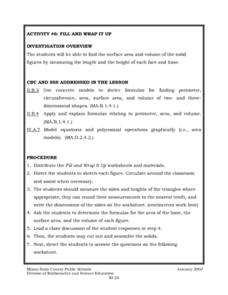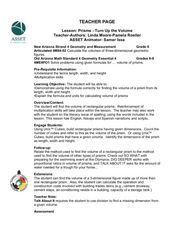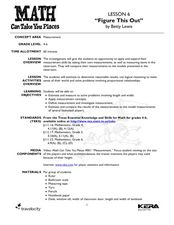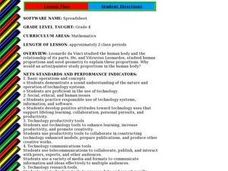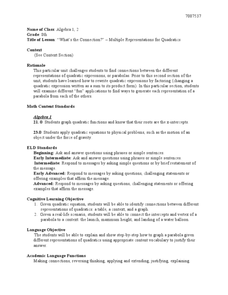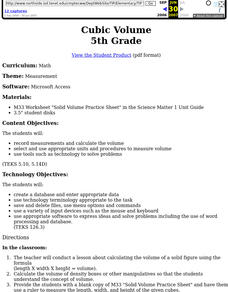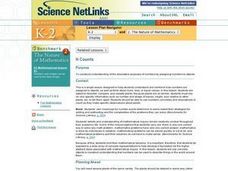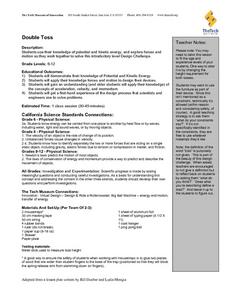American Statistical Association
Scatter It! (Using Census Results to Help Predict Melissa’s Height)
Pupils use the provided census data to guess the future height of a child. They organize and plot the data, solve for the line of best fit, and determine the likely height and range for a specific age.
EngageNY
Solving Basic One-Variable Quadratic Equations
Help pupils to determine whether using square roots is the method of choice when solving quadratic equations by presenting a lesson that begins with a dropped object example and asks for a solution. This introduction to solving by...
EngageNY
Using Trigonometry to Determine Area
What do you do when you don't think you have enough information? You look for another way to do the problem! Pupils combine what they know about finding the area of a triangle and trigonometry to determine triangle area when they don't...
Curated OER
Measuring Heights With Triangles
Students identify the different properties of triangles. In this geometry lesson, students differentiate between congruent and similar triangles. They use mathematical reasoning to solve word problems.
Curated OER
Volume of a Cylinder
Middle and high schoolers calculate the volume of cylinders. They measure the height, radius and diameter of cylinders. Following given formulas, students calculate the area and volume of the cylinder. They compare cylinders and predict...
Curated OER
Swimmy's Friends
Students solve problems using various strategies. For this problem solving lesson, students read the book Swimmy by Leo Lionni. Students make fish swimming patterns, measure how many goldfish crackers it takes to make a handprint and...
Curated OER
Building Scales and Ratios
Students solve problems using scales and ratios. In this algebra lesson, students create drawings using scales of 1:12. They follow a key to help them draw different buildings using the right scales. They also complete word problems as a...
Curated OER
Measurements
Seventh graders solve word problems involving real world situation. In this geometry activity, 7th graders solve problems related to volume. They apply the formulas taught in geometry.
Curated OER
Sink or Float
Second graders explore floating and sinking and make predictions about whether certain objects are likely to sink or float. They read the story Who Sank the Boat? by Pamela Allen. Pupils loacate rhyming words and discuss the events of...
Curated OER
One Size Fits All, Part 1
Can you tell how tall someone is just by looking at their feet? In this activity, young mathematicians measure their height, arm span, and foot size, graph their findings, and answer questions about how these measurements are related....
Curated OER
Data
Students collect data from an experiment they perform. In this data lesson, students use multiple representations to solve practical problems; describe advantages and disadvantages of the use of each representation. Then, they evaluate...
Curated OER
Fill and Wrap It Up
Students find the surface area and volume of the solid figures by measuring the length and the height of each face and base. They use concrete models to derive formulas for finding perimeter, circumference, area, surface area, and volume...
Curated OER
Prisms-Turn Up The Volume
Identify the length, width, and height of prisms. Critical thinkers calculate the volume of prisms given small amounts of information. They derive the formula given the length, width and height.
Curated OER
Similar Triangles - Applied Problems
Students differentiate between similar and congruent triangles. In this geometry lesson, students identify the angles of triangles using the similarity theorem. They apply concepts of triangles to the real world.
Curated OER
Marble Ramp
Fifth graders complete an assignment while working in groups. In this problem solving lesson students practice their problem solving skills while completing an activity.
Curated OER
The Tangent Ratio
Students calculate the tangent ratio given a right triangle. In this trigonometry lesson, students use a right triangle and the Pythagorean Theorem to solve problems.
Curated OER
Figure This Out
Learners measure different parts of the human body. In this measurement lesson, students work in pairs to take measurements of human measurements which include: arm span, height, foot length, and wrist to longest finger. They also...
Curated OER
Filling the Glass (Water, Air, and Fractions)
Students predict which of two glasses is 1/2 full using visual estimation, height measurement, and liquid measurement methods. Mathematical equations to accurately solve the problem are determined and verified.
Curated OER
Body Proportion
Fourth graders measure the height and arm span of various classmates. They use a spreadsheet to design a graph that shows the class measurements from tallest to shortest in metric and standard systems.
Curated OER
Representing Quadratics
Students represent quadratic equations using different methods. In this algebra lesson, students solve quadratics using substitution, elimination and graphing. They relate quadratics to the real world.
Curated OER
Cubic Volume
Fifth graders record measurements and calculate the volume. They select and use appropriate units and procedures to measure volume # use tools such as technology to solve problems
Curated OER
Lessons for Beginner Atlatl Users
Ninth graders research weapons of the Aboriginal people and throw a dart with and without the use of an atlatl. In this cross curricular lesson, 9th graders research the weapons of the Aboriginal people. They throw darts with and without...
Curated OER
It Counts
Students classify and compare plants using specific information, observations, and numbers. In this mathematical inquiry instructional activity, students use plant characteristics to describe, compare, and classify them. They attempt to...
Curated OER
Double Toss
Pupils experiment with potential and kinetic energy. They design a device that will toss a ball at least 30 centimeters, catch it and to the ball up again.






